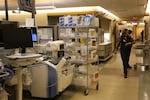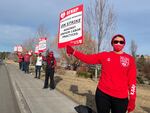Many of the people holding picket signs outside the St. Charles Bend hospital would normally be inside its most hallowed spaces. They staff the operating rooms, run the machinery or treat patients who can’t breathe alone. When about 140 of these medical technicians and technologists stopped working last week, a neurosurgeon said she delayed an operation out of concern for the patient’s safety.
“There are only two technicians that even know how to use the equipment I was going to use for the case. And frankly, I didn’t feel safe with a bunch of temps coming in,” Dr. Priscilla Pang said.
But administrative leaders of the St. Charles Health System say the strike isn’t affecting patient care and that qualified replacement workers are in place, covering shifts throughout the hospital. The facility receives some of the most seriously ill and injured patients for over 30,000 square miles of Oregon.
Related: Bend hospital workers begin strike
The walkout of medical technicians is the first worker strike at this hospital in more than 40 years. But it comes after years of less visible protests against St. Charles’ employment practices. Workers have alleged violations of labor laws to state agencies and to the courts, in some cases winning large settlements.
Now, a union says the technical workers are paid far less than comparable positions elsewhere, because of St. Charles’ outsized control over the region. Besides being the only hospital operator for a vast area, the health system is also the largest employer in Central Oregon. The technicians are demanding a contract with some of the same terms secured by a nurses’ union in 2019, including multiyear wage formulas and guaranteed cost of living adjustments.
Before more of St. Charles workers turned to unions, others went to federal court. In 2013, a class action lawsuit alleged the health system refused to pay workers for time spent on the mandatory job training. The case led to a $9.5 million settlement in 2017, with more than 1,100 employees receiving payouts.
A different class-action lawsuit from 2013 alleged that St. Charles’ physical and occupational therapists were expected to complete required tasks off the clock and without pay, according to that complaint. In 2017, the health system settled with 60 former and current employees for $950,000.
Since 2018, the state agency responsible for the enforcement of Oregon’s labor laws has received 11 complaints about alleged wage and hour violations by St. Charles. In 10 of those cases, the Bureau of Labor and Industries sent warning letters to the health system.
In one case from last month, BOLI said it received a complaint alleging St. Charles refused to pay employees for travel time between its various worksites. The letter urged St. Charles to review company practices, and if needed, “take immediate and proper steps to correct the situation.”
Last year, St. Charles admitted to violating state law related to required meal and rest periods. The state agreed not to levy penalties if the health system promised to follow the law in the future.
In 2017 and 2018, the Oregon Health Authority investigated staffing complaints at several St. Charles facilities. OHA investigators found that in Bend, the hospital did not provide enough nurses to cover for one another during breaks. That means that sometimes nurses were caring for twice the number of patients that they should have been. OHA also found understaffing issues at St. Charles’ Prineville and Madras facilities. The state required plans of correction.
“If ever we do make a misstep that impacts our caregivers, we will do everything we can to make it right. One example is missed meals and breaks at the Bend hospital,” St. Charles spokesperson Lisa Goodman said in a written statement Tuesday.

A view of the Emergency Department at St. Charles hospital in Bend, Ore., March 19, 2019.
Emily Cureton / OPB
She said since 2017, the health system spent $6 million on more nurses and devised a new staffing model. And in the last year, Goodman said St. Charles put its employees needs first.
“We made sure that no caregiver suffered from any reduced wages during this time despite a complete shutdown of our elective procedures,” she said, citing some $2 million in costs to pay for missed shifts during the pandemic.
Since last April, the health system has received about $32 million in emergency aid through the CARES Act, according to federal data.
Related: Bend hospital workers protest wages in St. Charles contract dispute
Registered nurse Joel Hernandez agreed conditions in the Bend hospital have improved in recent years. An Oregon Nurses Association member, Hernandez credits his union with bringing issues to light and pushing for change. But now, Hernandez fears a backslide, as temporary workers called in for the strike take over highly specialized jobs.
“Surgical cases have been canceled or delayed. Procedures have been canceled or delayed,” Hernandez said. “This is very concerning and very anxiety provoking.”
ONA has come out in support of the medical technical workers, who are represented by the Oregon Federation of Nurses and Health Professionals Local 5017.
“I think the hospital administration has not thought of us as essential, or core members of the organization, for a long time,” said union member Kim Roberts, a veteran X-ray technologist.
After 20 years with the Bend hospital, Roberts said she voted to form the union in 2019, hoping it would help secure better wages and working conditions. But after that vote, St. Charles raised wages by 10% for non-unionized tech workers at its other locations and not for the represented jobs in Bend.
“I want a fair contract, that’s all I want. I want to get back to work,” Roberts said.
But when that might happen is up in the air. In an unusual move, hospital negotiators did not meet with union representatives in the weeks leading up the strike, despite getting notice of when it would start. A recent email sent to employees says the health system is “contracting with an outside agency for a prolonged strike period.”

X-ray technologist Kim Roberts sports bright red on the picket line outside St. Charles hospital on March 4, 2021.
Emily Cureton Cook
“Once a caregiver chooses to participate in a strike, they are no longer able to come back to work while a replacement is in place,” St. Charles officials wrote in a March 5 staff email.
In a Monday press release, Bend hospital president Aaron Adams wrote: “We’ve not received a return to work notice from the union, which is the first step in the process of bringing our caregivers back to work.”
According to Adams’ release, the union has been “unresponsive,” and “two core issues still remain on the table: compensation and union security.”
“St. Charles technical employees’ jobs would be conditional upon joining the union and paying 1.4% of their base wage in dues, or paying agency fees and giving up voting rights,” the release states.
The hospital and union negotiators plan to meet over Zoom on Wednesday. The session with a federal mediator, about a week into the strike, will be their first real-time negotiations in more than three months.
For Dr. Pang, the neurosurgeon, it’s difficult to understand how things got to this point.
“It’s not like the techs are asking for anything ridiculous,” she said. Her clinic’s services are in such demand, she said, new patients typically wait two to three months to get an appointment. The case she delayed last week was somewhat rare and tricky, she said.
In some ways, working with temporary and traveling technicians and nurses is business as usual for doctors inside St. Charles facilities, Pang said, but the strike is different because there suddenly aren’t seasoned staffers overseeing them.
“It’s frustrating that, from a physician’s side of things, we are having to take that into account when we’re thinking about the safety of our patients,” she said. “It’s in everybody’s interest for St. Charles to support these workers.”

